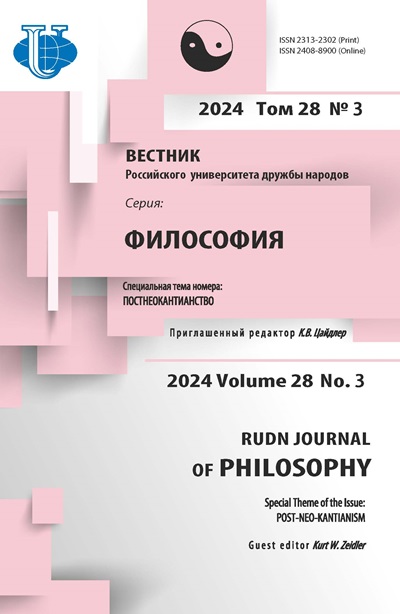Logical and Epistemological Doctrine of Leonid E. Gabrilovich on Mathematical Thinking and Actual Form
- Authors: Shevtsov A.V.1
-
Affiliations:
- Moscow Aviation Institute (National Research University)
- Issue: Vol 28, No 3 (2024): POST-NEO-KANTIANISM
- Pages: 726-739
- Section: HISTORY OF PHILOSOPHY
- URL: https://journals.rudn.ru/philosophy/article/view/40987
- DOI: https://doi.org/10.22363/2313-2302-2024-28-3-726-739
- EDN: https://elibrary.ru/VSQANT
Cite item
Full Text
Abstract
The research examines the logical and epistemological studies of Leonid Evgenievich Gabrilovich (1878-1953), a Russian philosopher, logic and engineer, and subsequently a Russian-American thinker. The works of L.E. Gabrilovich still remain practically unknown or little known in Russian philosophy. In the study of the philosophical concept of one of the main works of L.E. Gabrilovich “On Mathematical Thinking and the Concept of the Actual Form” (1914), the study of the theory of “actual forms”, which clarifies the foundations of human thinking, is central to the attention of readers. It is proved that the topics of mathematical formalism, the system of experience, the actual form and the problems of number touched upon by Gabrilovich were logical and epistemological aspects of his philosophy. The research covers the content of a review of this essay by Gabrilovich of the famous German mathematician and logic Leopold Löwenheim, published in 1915. The similarity of the theory of actual forms Gabrilovich’s and the meaning of the Löwenheim theorem is revealed. The analysis of Gabrilovich’s work conducted here covers little-known pages of Russian philosophical thought and should serve to enrich and fill existing lacunae in the study of Russian philosophy of the 20th century. In the process of studying the central work of Gabrilovich, results were obtained, on the basis of which they came to the conclusion that the Russian thinker sought to build a complete system of the science of philosophy. In his emigration, Gabrilovich turned to the legacy of such Russian philosophers as Vladimir Solovyov and Nikolai Berdyaev, which was surprisingly combined with mathematical thinking and the concept of actual forms. The study outlines the prospects for studying this and other works of Gabrilovich in the context of neo-Kantianism and the philosophy of mathematics. The original theory of “actual forms” proposed by Gabrilovich can be considered the result of a philosophical understanding of the foundations of mathematics, which was characteristic precisely for logical and epistemological philosophical searches.
About the authors
Aleksandr V. Shevtsov
Moscow Aviation Institute (National Research University)
Author for correspondence.
Email: ashevzov@mail.ru
ORCID iD: 0000-0002-0934-6054
CSc in Philosophy, Associate Professor, Associate Professor, Department of Philosophy
4 Volokolamskoye Hwy, Moscow, 125993, Russian FederationReferences
- Gabrilovitsch LE. Über mathematisches Denken und den Begriff der aktuellen Form. Berlin: Verlag v. Leonhard Simion publ.; 1914.
- Löwenheim L. Leonid Gabrilovitsch, Über mathematisches Denken und den Begriff der aktuellen Form. In: Archiv für system. Philosophie. Bd. 21. H. 1–4.; 1915. S. 101–102.
- Gabrilovitsch LE. Über zwei wissenschaftliche Begriffe des Denkens (Zur Grundlegung einer dativistischen Logik). In: Archiv für systematische Philosophie. Bd. XV; 1909.
- Gabrilovitch LE. About two scientific concepts of thought (on the basis of a dativistic logic). Shevtsov AV, transl. The Philosophy Journal. 2017;10(1):78–88. (In Russian). https://10.21146/2072-0726-2017-10-1-78-88
- Gabrilovitsch LE. Über Bedeutung und Wesen der Elementarbegriffe (Versuch einer neuen Inangriffnahme des Universalproblem). In: Archiv für systematische Philosophie. XVI. Bd; 1910. S. 453–497.
- Shevtsov AV. Translation of article by Aleksandr Shevtsov. Leonid Gabrilovitsh “On the meaning and essence of elementary concepts (attempt at a new approach to the universal concepts problem)”. Works and translations. 2019;1(2):249–276. (In Russian). https://10.24411/2587-7607-2019-10016
- Serdyukova EV. History of Russian philosophy or chronicle of Russian thought? Discussion about the Russian philosophy of N.O. Lossky and L. Galich (L.E. Gabrilovich). Journal of Russian Christian Humanitarian Academy. 2020;21(3):209–231. (In Russian). https://1010.25991/VRHGA.2020.21.3.016
- Alyaev GE. “The kingdom of the spirit must be free and multicolored” (Leonid Gabrilovich and Semyon Frank). Philosophical poliloge. 2018;2(4):118–142. (In Russian).
- Löwenheim L. Über Möglichkeiten im Relativkalkül. Mathematische Annalen. 1915;76:447–470. https://doi.org/10.1007/BF01458217
- Schuppe W. Zum Psychologismus und zum normierte Charakter der Logik. In: Archiv für syst. Philosophie. VII. Bd. Heft 1; 1901.
- Gabrilovich LE. So-called “formalism” in mathematics and its relationship to the theory of knowledge. Voprosy filosofii i psikhologii. 1913;119:471–513. (In Russian).
- Shevtsov AV. Michail I. Karinsky and Russian epistemology at the end of the 19th beginning of the 20th century. Moscow: Mir filosofii publ.; 2017. (In Russian).
- Shevtsov AV. Classical and non-classical logics in the historic and philosophical aspects. Ground principles and concepts. Moscow: INFRA-M. Publ.; 2020. (In Russian). https://10.12737/1018310
- Bazhanov VA. Logical and epistemological studies in Russia in the first half of the 20th century. In: Logical and gnoseological direction in domestic philosophy (the first half of the 20th century): M.I. Karinsky, V.N. Ivanovsky, N.A. Vasiliev. Bazhanov VA, editor. Moscow: Russian Political Encyclopediya publ.; 2012. P. 5–14. (In Russian).
- Motorina LE. A man as anthropological integrity. Philosophical reflection. Nova Prisutnost. 2017;15(1):31–46.
- Shevtsov AV. The philosophical teaching of Leonid Gabrilovich in the context of the logical and epistemological direction in the history of Russian thought of the 20th century. Philosophy Journal. 2024;17(2):168–183. (In Russian). https://10.21146/2072-0726-2024-17-2-168-183
















